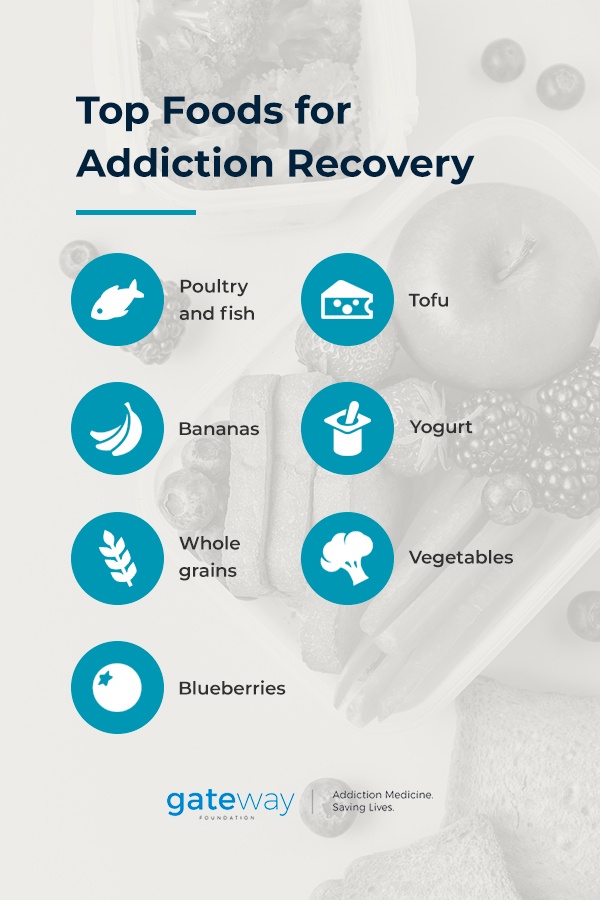- May 9
- Drug Addiction Treatment
It’s important for every person to develop healthy eating habits, but it’s crucial for people who are recovering from a drug or alcohol addiction. Even short-term addiction can take a huge toll on the body as it is forced to work overtime to eliminate toxic substances and defend itself against the damage they do. Achieving nutritional balance is essential in repairing the harm addiction does to the body.
In this guide, we’ll explain everything you need to know about using nutrition to your benefit as you heal from addiction.
- How Substance Abuse Disrupts Nutrition
- How Nutrients Affect the Body
- Using Nutrition to Improve Neuroplasticity
- The Role of Nutrition During Rehab
- Nutritional Side Effects of Unassisted Withdrawal
- Treating Co-Occurring Eating Disorders
- Top Foods for Addiction Recovery
- At Gateway Foundation, We’re With You for Life
How Substance Abuse Disrupts Nutrition
Each substance has its own set of specific effects on health, but many of them have similar impacts on a person’s ability to get all the nutrients necessary for health in recovery. Those who abuse any drug are likely to experience one or more of these broad symptoms:
- Loss of appetite: Many substances suppress appetite or cause the user to forget about eating altogether.
- Poor eating choices: People under the influence are more likely to make poor decisions, like living on a diet of fast food or sweets.
- Hypoglycemia: Low blood sugar can be caused by a lack of sustenance or proper diet.
- Organ damage: Most drugs cause direct damage to the organs responsible for nutrient breakdown and processing.
- Gastrointestinal disorders: Alcohol and other drugs contribute to chronic issues in the gastrointestinal (GI) tract that prevent it from effectively taking up nutrients in food.
 Alcohol and Nutrition
Alcohol and Nutrition
People who abuse alcohol typically do not pay attention to nutrition. Even those who were formerly healthy tend to let their good eating habits go as they become more consumed with the need to find and drink alcohol. This creates a two-fold nutritional problem because even if someone does manage to eat healthfully and get all their nutrients, alcohol prevents them from being fully absorbed.
Alcohol abuse also causes severe harm to two critical digestive organs: the pancreas and liver. The pancreas makes enzymes necessary for digesting fats, proteins and carbs. It also produces hormones essential for balancing blood sugar. The liver breaks down toxins, including alcohol, and if it stops working correctly due to heavy drinking, the alcohol will circulate in the blood for longer and cause more damage to the digestive system.
Alcohol abuse is known to cause severe deficiencies in these essential nutrients:
- Folic acid
- Vitamin B6
- Thiamine, or B1
Lack of these nutrients can result in anemia, which makes the sufferer feel cold, lethargic and frequently dizzy. They may also experience frequent headaches and feel short of breath.
Thiamine deficiency is particularly dangerous, as it increases the likelihood of developing neurological conditions like Wernicke-Korsakoff Syndrome.
 Opioids and Nutrition
Opioids and Nutrition
When someone begins regularly misusing opioids, they often begin to develop disordered eating. There are several patterns of eating that result from appetite suppression due to excess dopamine production and the competing priorities of eating and continuing drug use. These include:
- Eating fewer than two meals a day
- Putting off meals to prolong the opioid intoxication
- Skipping meals
- Failing to eat enough fruits and vegetables
Another issue is opioid-induced constipation, which can become severe over time. As the condition worsens, appetite suppression increases and eating can become painful. Stopping opioid abuse and increasing fiber intake is the only way to get back on track after opioids have hijacked your nutrition.
Stimulants and Nutrition
Stimulants also cause appetite suppression, but do so by making people feel more energetic and “invincible” as though they don’t need to eat. People who abuse stimulants frequently go on binges of the drug in which they don’t eat or drink enough to nourish the body. Dehydration, electrolyte imbalances and heavily reduced food intake inevitably lead to malnutrition in those who use stimulants heavily. Some of the problems from this lack of nutrition include:
- Mental health issues like depression and anxiety
- Cognitive issues like confusion and trouble problem-solving
- Disturbances in heart rate and rhythm
- Low body temperature
- Muscle wasting
- Weight loss
After stopping stimulants, it’s common to experience a strong spike in appetite — which may lead to overeating — that can overwhelm the weakened digestive system. A treatment program that pays close attention to nutrition for recovering addicts will create a meal plan with appropriate portions that will allow a healthy reintroduction of healthful food into the body.
 Marijuana and Nutrition
Marijuana and Nutrition
Marijuana is known to significantly increase appetite. While this can be helpful for people with chronic diseases like cancer, it can be dangerous for people without conditions because it encourages them to eat more often, in greater quantities and with less attention toward nutrition. Someone abusing marijuana is likely to choose foods typically associated with cravings, such as those that contain significant amounts of saturated fat, sugar and salt.
Consuming a diet like this long-term increases cholesterol, possibly leading to heart disease and failure. It may also contribute to diabetes.
How Nutrients Affect the Body
Understanding the relationship between nutrition and addiction recovery means understanding the roles nutrients play in the body. There are six nutrient groups derived from food that are considered essential, and they can be divided into micronutrients and macronutrients.
Macronutrients are those your body needs in large amounts each day to function. Micronutrients are just as important, but you don’t need to consume as much of them to stay healthy. Vitamins and minerals are micronutrients, while the macronutrients you need are protein, fat, carbohydrates and water.
1. Vitamins
The human body needs 13 different essential vitamins to stay healthy. They are categorized by fat solubility or water solubility. Fat-soluble vitamins are:
- Vitamin A
- Vitamin D
- Vitamin E
- Vitamin K
The water-soluble vitamins are:
- Vitamin B-1 (thiamine)
- Vitamin B-2 (riboflavin)
- Vitamin B-3 (niacin)
- Vitamin B-5 (pantothenic acid)
- Vitamin B-6
- Vitamin B-7 (biotin)
- Vitamin B-9 (folate or folic acid)
- Vitamin B-12 (cyanocobalamin)
- Vitamin C
Consuming a full suite of vitamins is essential because it:
- Supports the immune system
- Develops strong bones and teeth
- Facilitates calcium absorption
- Keeps skin and hair healthy
- Facilitates protein and carbohydrate metabolization
- Aides function of the brain and nervous system
2. Minerals
The other type of micronutrient is minerals. Within this category is another division: major and trace minerals. The major minerals are:
- Calcium
- Magnesium
- Phosphorus
- Potassium
- Sodium
- Sulfur
These minerals allow your body to keep appropriate hydration levels, plus healthy hair and bones. The trace minerals you need are:
- Chromium
- Copper
- Fluoride
- Iodine
- Iron
- Manganese
- Molybdenum
- Selenium
- Zinc
Getting enough of these trace minerals contributes to:
- Healthy blood pressure
- A healthy immune system
- Proper blood clotting
- Oxygen transfer
- Tooth decay prevention
 3. Protein
3. Protein
Proteins are often referred to as the building blocks of the body. While it is most closely associated with muscle building, protein is found in every cell of the body, from bones to skin and hair.
Proteins are composed of a variety of amino acids. Your body is able to synthesize some of the amino acids on its own, but there are several you can only absorb from food. The body needs varied sources of protein for optimal function.
4. Fat and Fatty Acids
Fat has gotten a bad rap in recent decades, as it can be associated with weight gain and poor health. However, it is essential to distinguish between unhealthy saturated or trans fats and healthy fat types like monounsaturated and polyunsaturated fats. Healthy fats are necessary for:
- Hormone production
- Blood clotting
- Muscle function
- Blood sugar regulation
- Brain function
- Vitamin and mineral absorption
- Immune function
The 2015-2020 edition of Dietary Guidelines for Americans indicates that 20% to 35% of daily calorie intake should come from healthy fats.
 5. Carbohydrates
5. Carbohydrates
Carbohydrates, or carbs, are another nutrient that has been targeted for heavy reduction or elimination by diet fads. However, carbohydrates are essential for the function of the central nervous system and brain. They are so important that the Dietary Guidelines for Americans suggests 45% to 65% of daily calories should come from carbs.
It’s important to distinguish between the less healthy simple carbs and beneficial complex carbs. Foods that include bleached flour and sugar should be avoided, while complex carbohydrates like whole grains and starchy vegetables should be heavily incorporated into a diet for recovering alcoholics or addicts.
6. Water
While the body can withstand malnutrition for weeks, if not longer, dehydration quickly becomes a matter of life or death. Water makes up around 60% of the body and plays vital roles in nearly every function. Critical examples include facilitating brain function, improving mood, flushing out toxins and transferring nutrients between cells.
The National Academies of Sciences, Engineering, and Medicine suggest 11.5 to 15.5 cups of water per day for adults.
Using Nutrition to Improve Neuroplasticity
Neuroplasticity is a key concept in addiction recovery. Neuroplasticity is the brain’s ability to form new connections and rearrange old ones, typically in response to injury, disease or a change in the environment. The development of addiction is itself an example of neuroplasticity, as the reward pathway’s activity chemically adapts to the presence of drugs or alcohol.
Once addiction has forced changes in the brain, however, it damages neuroplasticity and makes it much harder to adapt to sobriety. Additionally, the adaptations that the brain develops disrupt crucial neuropathways, decreasing neurotransmitters and their ability to move normally through the brain.
Brain imaging studies have revealed that drug addiction disrupts connectivity between different parts of the brain, making it more difficult to re-stabilize healthy neurotransmission during recovery. Fortunately, adequate nutrition can improve neuroplasticity by helping the brain replenish normal amounts of neurotransmitters. Here is how the building blocks of nutrition help restore plasticity to the brain:
- Carbohydrates: Aside from being the body’s primary energy source, carbs help the brain produce serotonin. This neurotransmitter is necessary for a stable mood, healthy sleep and reduced cravings for drugs or alcohol.
- Amino acids: Without enough amino acids, the brain cannot produce enough of the neurotransmitter dopamine, which results in more severe cravings, negative mood changes and greater aggression.
- Dietary fat: Dietary fat facilitates the regeneration of neuroplasticity by reducing inflammation and protecting the integrity of cell membranes in the brain.
- Omega-3s: Omega-3 fatty acids also decrease inflammation and help the brain increase neurotransmitter uptake.
- Omega-6s: These fatty acids balanced with omega-3s increase the function of neurotransmitter receptors, helping to increase the overall amount and activity of neurotransmitters in the brain.
The Role of Nutrition During Rehab
The majority of evidence-based treatment programs understand the importance of nutrition for recovering addicts and incorporate nutrition plans to help patients heal more fully. Designing a meal plan that is balanced and satisfying is one way to significantly improve the experience of treatment. The steps in nutrition incorporation vary between treatment centers, but you can expect a process similar to the steps below:
1. Meet With a Physician
As part of the intake process, patients meet with a physician for a review of health history and discussion of the specific issues related to substance abuse. The review should include a talk about eating habits and weight that touches on:
- Weight gained after abusing depressants or sedatives, including opioids, benzodiazepines and alcohol.
- Weight lost due to appetite suppression created by stimulants.
- Nutrient deficiencies arising from organ damage or poor eating habits.
- Potential co-occurring eating disorders that may be a cause or result of substance abuse.
Once the doctor outlines the patient’s issues related to food and nutrition, it’s time for a nutritionist to step in.
 2. Work With a Nutritionist
2. Work With a Nutritionist
The program’s nutritionist takes notes from the physician and analyzes them to determine what nutritional needs the patient has. One of the factors to consider is the person’s stress levels, which are almost certain to be high during treatment. As the brain is working to re-balance itself after chronic drug and alcohol abuse, the stress hormone cortisol is over-produced and can deplete critical nutrients, including:
- Vitamins A, C, E and B-family
- Minerals, including zinc and magnesium
- Fatty acids
- Electrolytes, such as sodium and potassium
Once specific deficiencies have been targeted, the nutritionist can plan meals designed to replenish the missing nutrients while also providing the patient with well-balanced amounts of all six essential nutrients.
3. Develop a Nutritional Plan
The development of a nutritional plan for those in recovery involves planning out meals and determining an appropriate meal schedule that meshes with other activities in the treatment plan.
This also involves taking into account any issues the patient has around food, including eating disorders. Depending on individual needs, the plan may leave room for snack times, or it may be a better option to restrict intake to three times per day if the patient has issues with things like binge eating.
4. Act on the Plan
Determining nutritional needs and providing healthy meals is not the only element of nutrition for recovering alcoholics and addicts. A good nutrition plan will help the patient learn and practice good habits on their own, such as:
- Eating only at planned times
- Choosing foods low in fat and sodium
- Eating enough whole grains and fiber
- Avoiding caffeine and sugar
- Regularly taking any vitamin or mineral supplements as necessary
Giving patients the opportunity to practice good eating habits is essential, especially since food addiction can often replace drug addiction. By instilling an understanding of nutrition and supporting healthy habits, a quality addiction treatment program teaches patients to use food as a healthy tool for sustained recovery rather than something that provides instant gratification.
 Nutritional Side Effects of Unassisted Withdrawal
Nutritional Side Effects of Unassisted Withdrawal
The first step in treating addiction to any substance is to remove all traces of the substance from the body. Unfortunately, many people attempt to quit drugs or alcohol on their own, which almost never works. No matter what the substance or the person’s history of abusing it, the withdrawal phase is where most people fail when trying to fight addiction alone.
Attempting to go through withdrawal without medical supervision results in a long list of unpleasant symptoms, some of which have dire consequences for nutritional balance. The nutritional side effects of unassisted withdrawal for most substances include the following:
- Nausea and vomiting: It is common not to be able to keep food down during withdrawal, which means people miss out on key nutrients before they can be absorbed by the body.
- Lack of appetite: Many people can’t or don’t want to eat at all, quickly leading to general weakness and malnutrition.
- Dehydration: Many people go into unassisted withdrawal already dehydrated from chronic drug and alcohol use, and the condition only worsens if there is no medical supervision.
The goal of withdrawal management programs is to provide patients with medical care and sometimes medication in order to maintain the healthiest state possible while the body is eliminating drugs or alcohol. This may include things like an IV drip for hydration or vitamins to keep levels of both stable throughout withdrawal, leading to a smoother transition to treatment.
Treating Co-Occurring Eating Disorders
Eating disorders and substance abuse are closely linked. Up to 50% of people with an eating disorder abuse drugs or alcohol, which is five times the rate of the general population. Additionally, up to 35% of people who have abused drugs or been addicted also struggle with an eating disorder. That’s a rate 11 times higher than that found in the general population.
Eating disorders and substance use disorders share multiple similarities in displayed behavior. The escalation of substance abuse comes with increasingly severe cravings and the inability to control consumption despite building negative consequences. In the same manner, those who have bulimia and binge eating disorders experience extreme cravings for food and feel a loss of control when over-consuming. Both food and addictive substances present ways to escape from or numb unwanted feelings.
Dual diagnosis treatment programs for substance abuse and eating disorders focus on addressing both conditions and their common roots, rather than trying to treat one after the other. These programs are unique to the individual and the complex interplay between the conditions but typically involve individual and group therapy designed to heal the patient from both sides.
Top Foods for Addiction Recovery
What does a recovering alcoholic’s diet look like? Working toward a balanced diet is not always easy, but this list of foods to eat while going through a medically supervised withdrawal from drugs is a good place to start your nutrition and addiction recovery process:
- Poultry and fish: These foods contain tyrosine, an amino acid essential in creating dopamine and norepinephrine. Drug abuse prevents the body from processing tyrosine, so adding more poultry and fish is a good way to enhance your mood and well-being.
- Tofu: Tofu is a good way to get low-calorie, low-fat protein you need to help your liver recover from damage caused by alcohol and other drugs. The lack of fat in tofu creates less work for the liver in the digestive process, allowing better healing.
- Bananas: Bananas are both a convenient snack and a source of the amino acid tryptophan, which is needed to produce serotonin for healthy sleep. Bananas are also a good source of potassium, vitamin B6 and vitamin C.
- Yogurt: Repairing the digestive system after drug and alcohol abuse is essential for increasing your body’s absorption of nutrients. Yogurt contains probiotics that can help your gut build up a healthy microbiome in recovery.
- Blueberries: Blueberries contain antioxidants, which help boost the immune system and reduce the overrun of free radicals and other toxins created by drug and alcohol addiction — this makes them an important part of a diet for a recovering alcoholic or addict.
- Vegetables: Any and all vegetables provide a range of vitamins, minerals, fiber and other key nutrients that the body needs for fuel and function. Leafy greens like kale, cruciferous vegetables like broccoli and starchy veggies like potatoes all play their role in returning the body back to health after addiction.
- Whole grains: Whole grains provide the body with complex carbs that keep you feeling fuller for longer, and they also contribute much-needed fiber to help the digestive system recover. You can often find whole-grain versions of foods like bread and pasta to replace their white flour counterparts.
The most important part of nutrition for recovering alcoholics and addicts is to find the foods that work for you and the ways you like to eat them. For instance, you may not like raw kale but find that braising it makes it much more palatable. Experimenting within the bounds of healthy foods is one of the best ways to fuel your recovery.
 At Gateway Foundation, We’re With You for Life
At Gateway Foundation, We’re With You for Life
At Gateway Foundation, we understand the importance of nutrition for recovering addicts, and we incorporate it into our many recovery programs and services. Every individual has different nutritional needs that can impact their experience in treatment, which is why we work hard to provide customized treatment plans that address nutrition.
To learn more about how Gateway Foundation can help you or someone you care about, call us at 877.505.4673 or send us a message through our contact form.

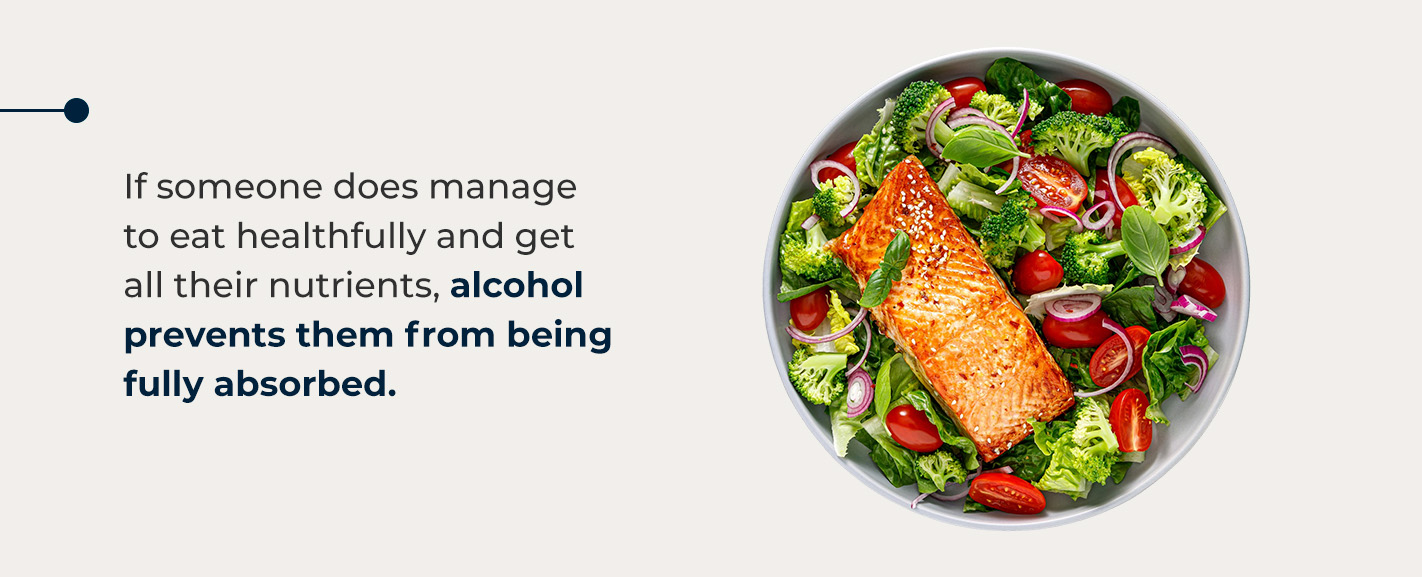 Alcohol and Nutrition
Alcohol and Nutrition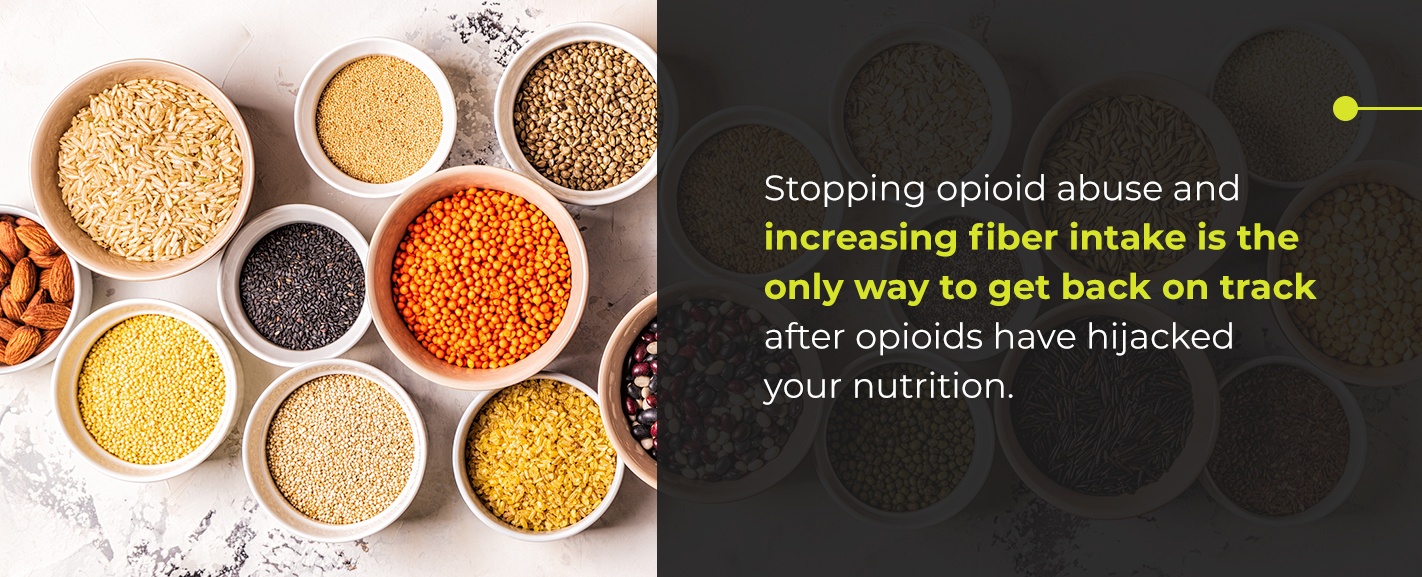 Opioids and Nutrition
Opioids and Nutrition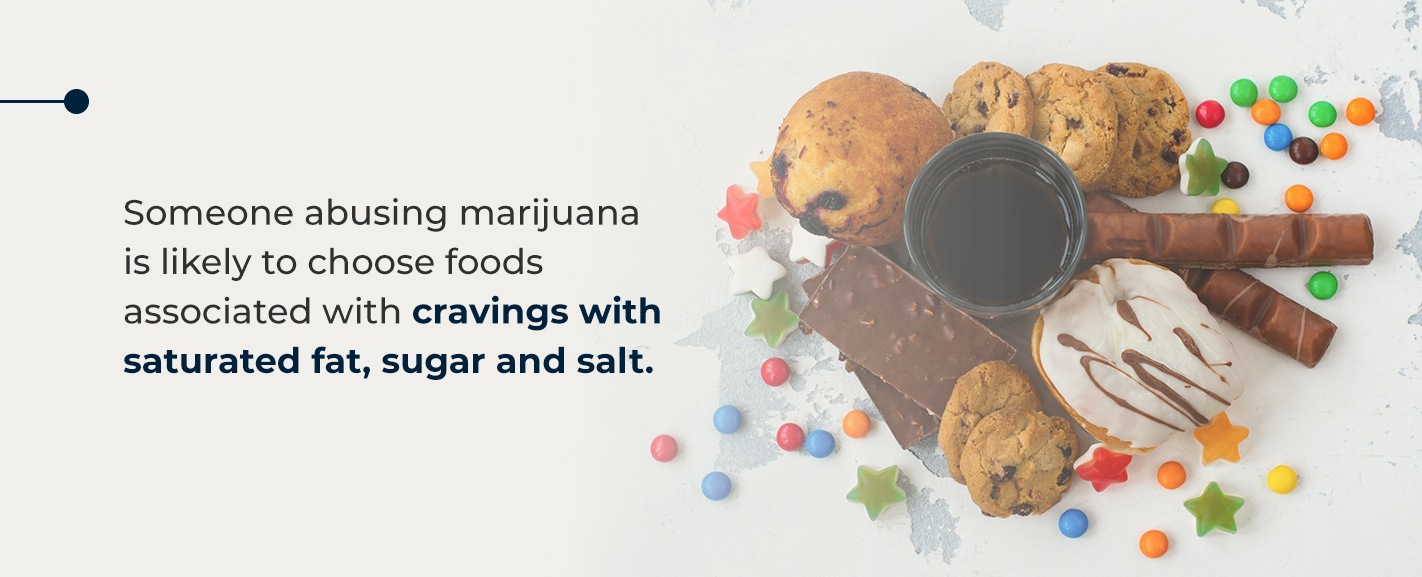 Marijuana and Nutrition
Marijuana and Nutrition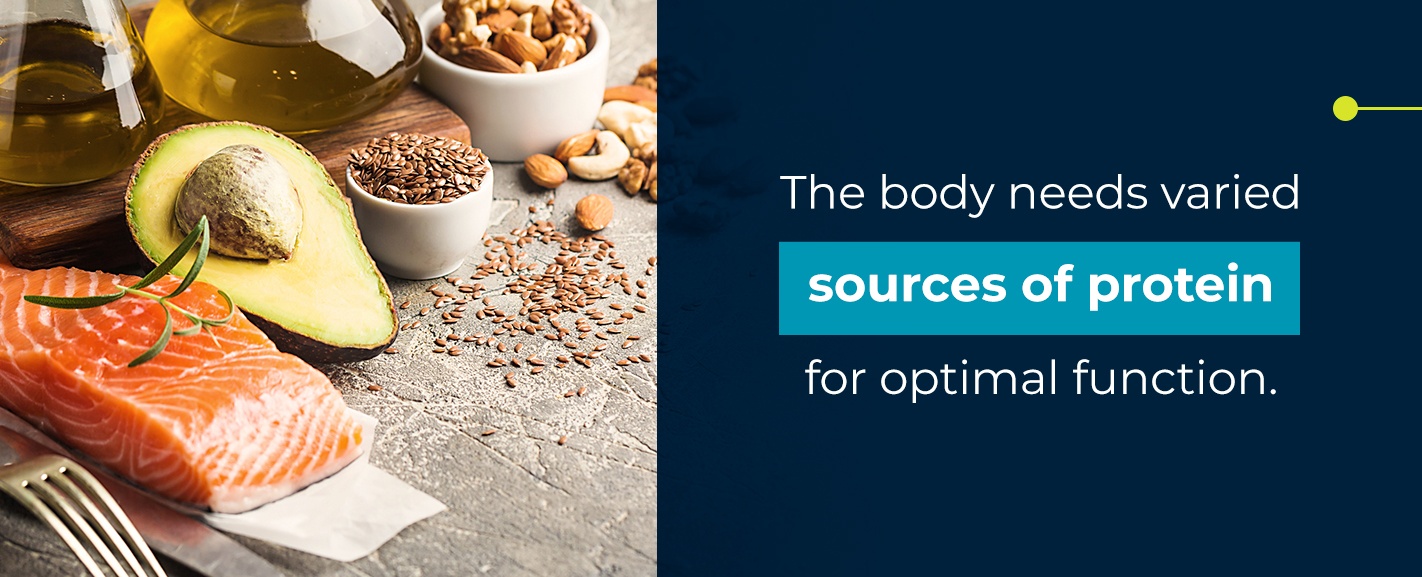 3. Protein
3. Protein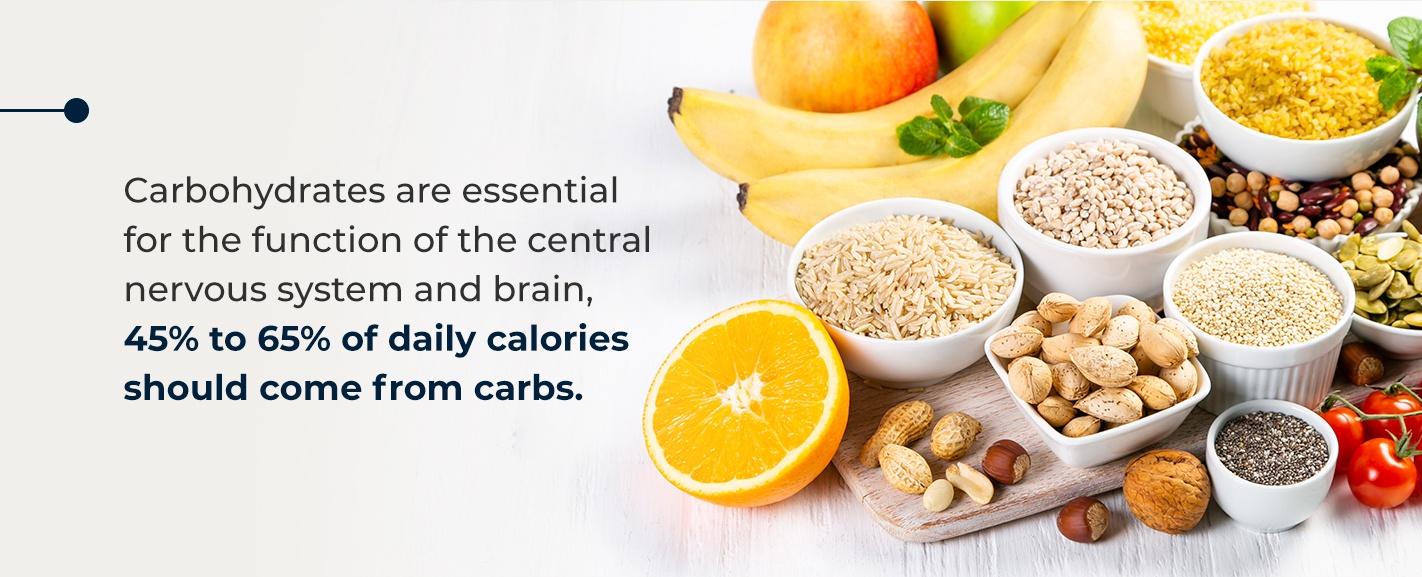 5. Carbohydrates
5. Carbohydrates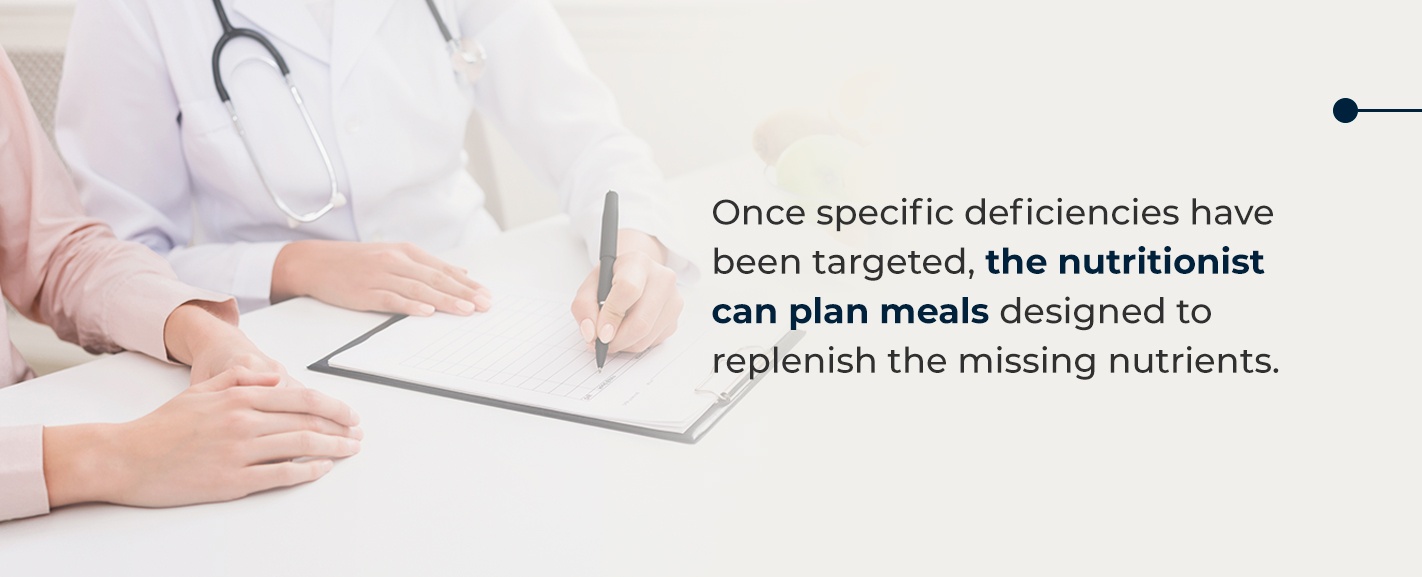 2. Work With a Nutritionist
2. Work With a Nutritionist Nutritional Side Effects of Unassisted Withdrawal
Nutritional Side Effects of Unassisted Withdrawal